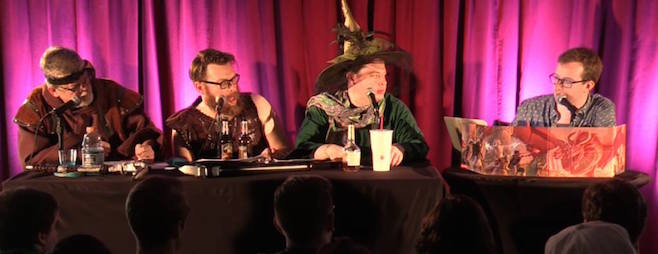
The podcast field is dominated by long-established comedians, celebrities, and major media outlets. But the medium has a few organic stars of its own, including brothers Justin, Travis, and Griffin McElroy. They’re the hosts of the long-running comedy advice show “My Brother, My Brother, and Me,” which has earned them a sizable fanbase and a just-announced developmental deal with NBC’s new streaming comedy channel Seeso.
The McElroys are lifelong friends of mine, so witnessing their internet fame in real life can be surreal. Last month they hosted a live holiday special in our hometown of Huntington, West Virginia. Fans traveled from across the country to see them; at the afterparty, there was a huge line to speak to each brother. Their appeal makes sense—they're really funny—but, like, I have memories of them as gawky teens making fart jokes and unironically wearing bowling shirts. Seeing them receive a hero's welcome from total strangers is as awesome as it is odd.
The brothers have a few podcasts and video series in circulation (the medical history show, the gas station food review show, the apocalypse one, the one about “The Bachelor”, the videogamestuff), and the most ambitious of them all is “The Adventure Zone.” The premise: Every two weeks, the three brothers play D&D with their dad, Clint McElroy, over Skype. It started as a holdover episode of “MBMBaM” and an excuse for them to play the latest edition of D&D. On paper, especially for people who don’t play tabletop role playing games (like me), the podcast sounds boring. But even though there’s a fair amount of dice rolling, leveling up, and character sheet maintenance, “The Adventure Zone” plays to a wide audience by focusing on what’s at the heart of D&D: engaging storytelling.

Griffin is the dungeon master, which means he’s the mastermind of the operation. He writes scenarios where the heroes have to solve his murder mystery puzzle, win his Fast and the Furious-style “battlewagon” race, and yes, occasionally fight orcs and “gerblins.” The tone of the podcast is intrinsically joke-heavy, with boss enemy names like “Magic Brian” and longform improvised goofs about “Fantasy Costco” and Motel 6 spokesman Tom Bodett. It’s the absurd flotsam of four guys making jokes during a D&D game, except it’s being recorded and, at some point, illustrated by someone’s fan art.
While his brothers and dad come through with off-the-cuff goofs, Griffin’s job is more arduous. Between writing, recording, and editing, he estimates that he puts in at least 15 hours of work per episode (compared to the two hours it takes to make “MBMBaM”). In early November, he added another responsibility to his already hefty pile. Using a Rock Band 3 keyboard, a cheap MIDI converter he found at Guitar Center, and the free copy of GarageBand that came with his computer, he started creating original music to accompany each narrative. As his setup implies, the podcast’s music is ambient and minimal, and removed from the context of the show, there’s not much happening—Griffin describes them as “45-second radio stingers”. They’re the sort of brief, transitional moments found in old video games.
But even if they’re unassuming as standalone songs, his simple bits of music began to make a huge difference in how the show’s narratives came across. Griffin recently introduced a pair of characters and has gradually built their love story over 10 hour-long episodes. After the final boss fight, the jokes fell away, resolving the story with a heavy, beautiful moment. The accompanying music ("Discovery and Recovery") was spare and serene—a huge departure from the show’s usual vibe—and after the episode went up, fans tweeted about their tears. “That was a genuinely risky episode for us,” he said. “I was genuinely worried that people were going to be like, ‘That fuckin’ sucked, [the music] was really distracting, and I hated it.’ But yeah, the reaction was really cool.”
The fan reaction was the catalyst for even more music-assisted storytelling. In the next episode, an otherwise silent enormous jellyfish creature let out a few booming drone sounds for a duet with a violinist. Every world has its own theme—the one covered in crystals is soundtracked by a hook he accidentally cribbed from Carly Rae Jepsen’s E•MO•TION. But according to Griffin, the reason for picking up the Rock Band 3 keyboard at all was for “Crystal Kingdom”—a recent moment where the heroes are confronted by a new voice—one that’s ethereal and synthetic.
Griffin made the voice using Vocaloid, the singing voice synthesizer. He got the idea after listening to Porter Robinson’s album Worlds. “It kind of clicked that I could do as many character voices as I want, but it would be really cool to do a new character on the show using a Vocaloid voice,” he said. He’s quick to downplay his musical ability, describing any previous attempts at making music “shitty shitty bad bad garbage music,” but after some research, practice, and experimentation, he figured out how to create his new voice. “Honestly, I figured it out in about an hour,” he said. “It’s not that hard.”